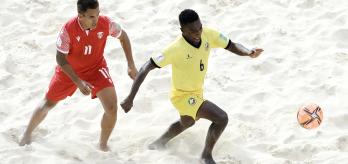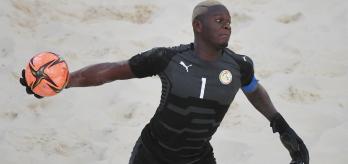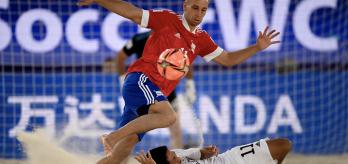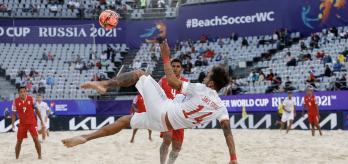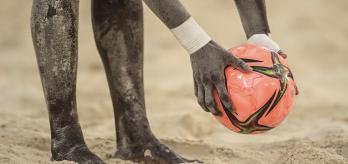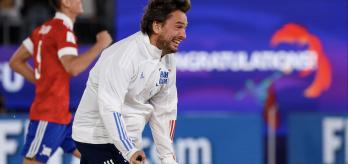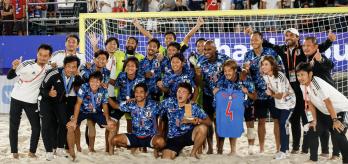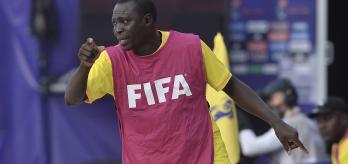PREPARATION
How were your preparations prior to the World Cup?
Tabata: Due to the coronavirus pandemic, we were short of overseas experience. However, we were constantly holding domestic training camps to prepare as well as was possible in the circumstances.
Moreira: Our preparations were in Japan, holding a camp almost every month. Unfortunately, we couldn’t leave the country to play in any friendly matches or tournaments but we had a good preparation.
Did you have all the players available that you wanted?
Tabata: There were significant player injuries. Personally speaking, we only had half of the players I wanted.
How did the four-second rule affect your team's play?
Tabata: We became faster in attack and more aggressive going for goal.
Moreira: We didn't have much time to prepare our team with the new rules. These new rules have totally changed our playing style, albeit we didn't have many problems during the World Cup.
What were the difficulties you encountered in the group stage and how did you solve these?
Tabata: It is always difficult to win against any country. I analysed the countries we were playing against and shared my thoughts on what we should do as a team.
Moreira: I think our problem was that we didn't have any matches before the World Cup so some players were a little nervous as it was the first World Cup for some of them. That's why we didn't have a good start in our first match [falling 3-0 behind against Paraguay in an eventual 7-4 victory].
For the next World Cup we need to give a chance to young players and keep playing [games] outside of Japan against strong teams in order to learn more.
Did you change the way you played in the knockout matches, from the quarter-finals onwards?
Tabata: While continuing with the same playing style, we looked to compete [better] by changing our kick-off and defensive tactics.
Moreira: I made some changes due to the opponents we were facing.
Teruki and Ozu, you were team-mates on the field up to the last World Cup in Paraguay. What kind of relationship did you have, and how did you divide the roles at this tournament in Russia, in terms of preparation for the event and before, during, and after matches?
Tabata: From entering the tournament in Russia, as coach I was carrying out training, meetings and analysis, and [responsible for] substituting players and changing tactics during the matches.
Moreira: I’ve known Tabata since I came to Japan 15 years ago. We played a long time together [so] it was not difficult to work together with him as coach. We have a good relationship when we work together. It was our first tournament working in this way and I think we learned more with this experience.
BEACH SOCCER WORLD CUP RUSSIA 2021
Teruki and Ozu, you’ve made history, haven’t you? In 2019, you lost to Portugal in a penalty shootout in the semi-finals, and missed out on the bronze medal. You then reached the final of the FIFA Beach Football World Cup in Moscow, becoming the first Asian team to do so. The result in Paraguay in 2019 was already exceptional, but were you expecting such an improvement?
Tabata: I played as a member of the Japan national team for many years. I was able to improve various aspects of the Japan team, not just in comparison with 2019, but in comparison with all past performances I had seen. But I didn’t expect such an improvement.
Moreira: Yes, we had a great World Cup in Paraguay. We were very sad because we could not get a medal. For this World Cup in Russia we was very focused on getting among the medals.
Ozu: You personally had an excellent World Cup two years ago. You won the FIFA Golden Ball, scored seven goals and were a key player. In this last World Cup you scored only one goal. Were you just out of luck or did you deliberately pay more attention to defending in the team?
Moreira: At this World Cup I was concentrating on our defence. We lost another defender before we flew to Russia, so we just had me as our main defender. I was holding back in defence and letting the other players play with freedom and attack.
Teruki and Ozu: You played against RFU twice. The first time was at the end of the group stage when you had already qualified for the quarter-finals, though if you’d won, you’d have finished top of the group. And then you played them again in the final. Do you think the big defeat (1-7) in the first match against the host country had a negative impact on your team's performance in the final?
Tabata: It was a huge defeat in the group stage, but we also had bad luck in terms of the goals we conceded. RFU were in danger of being eliminated if they’d lost. I thought it would be a difficult match, and I knew it wouldn't be easy to win, so it didn't have a negative impact on the team’s performance. At that moment, I think we did our best.
Moreira: Against RFU in the first match we didn't have a good start to the game and they scored three goals in the first period. That's why we lost control of the match. Against strong teams we cannot play like that.
CONCLUSIONS
Teruki and Ozu, looking to the future, the only way to improve on the result in Russia is to actually win the World Cup. What are your plans and what are you going to do to achieve this goal?
Tabata: I would like to focus on discovering and nurturing young players who are world-class and able to play an active role in making Japanese beach football competitive at the highest level.
Moreira: For the next World Cup we need to give a chance to young players and keep playing [games] outside of Japan against strong teams in order to learn more. I want a mix of experienced players and young players. It will be a very difficult mission but we need to achieve it for the future of our team.











